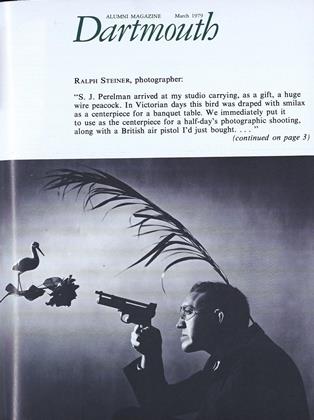At their meeting on February 23-24, the Trustees decided not to decide about abolishing fraternities. Instead, they unanimously adopted a seven-part statement apparently designed to satisfy those on both sides of the issue, as well as to encourage the houses to shape up.
The document commends the faculty for its concern, which the Trustees profess to share, and for initiating a "productive debate." It also commends the Interfraternity Council for its "positive response" and calls upon fraternity and sorority members to continue the process of "constructive change." In addition, the statement asks both the Fraternity Board of Overseers and the Executive Committee of the Faculty to make independent 12-month studies and to report on the progress made by fraternities. The Overseers are supposed to "help reduce the dominance by fraternities of the social life of the College," and the Executive Committee is supposed to tell the Trustees if the changes "are sufficiently responsive to the concerns expressed by the faculty."
The final clause of the statement carries the Trustees' response a bit further than previous declarations in the long history of flare-ups over the fraternity system. It says that if the Trustees become "convinced that significant changes are not occurring, or that the rate of change is too slow, then the board will be prepared to vote on the abolition of the system of fraternities and sororities," which is what Professor James Epperson convinced the faculty to do last fall.
What happens next depends a great deal upon how fraternity and sorority members interpret the decision, on whether they see it as a reprieve or a reprimand, and on whether they live up to promises to behave in a more civilized fashion. It will be interesting to see if some of the sharper critics of the system would rather see the fraternities fold than improve.
Throughout the course of the fraternity debate, some people have suggested that the charges of obnoxious behavior, intoxication, racism, sexism, anti-antiintellectualism — to name some of the more outstanding offenses — apply to Dartmouth students in general as much as to fraternity members. In another vote, described by President Kemeny as separate from but related to the fraternity issue, the Trustees affirmed the essential importance of a "civilizing quality of student life that is mutually supportive, enhancing and fulfilling for all." To promote the fullest achievement of that "civilizing quality," the Trustees replaced the Committee on Student Residence with a committee to study the quality of student life, "including social and residential alternatives, more creative use of dormitories and other buildings, and the development of plans for the utilization of facilities currently occupied by fraternities at such a time as they may become available."
President Kemeny explained that the statement about the availability of fraternity facilities refers only to the houses that might go out of business and does not anticipate abolition of the entire system. He also said it is his personal hope that the Trustees will not feel compelled to vote on abolition.
It seems likely that the professors who voted to abolish fraternities anticipated the more moderate approach taken by the Trustees. At a meeting of the faculty just two days after the Trustees met, when President Kemeny announced the decision to put the system on probation, no one even discussed it.
 View Full Issue
View Full Issue
More From This Issue
-
 Feature
FeatureNine to Midnight (or two if hot)
March 1979 By Shelby Grantham -
 Feature
FeatureSTEINER: by himself
March 1979 -
 Books
BooksNotes on lost causes and an enlistment against Nature, as brave as it was brief.
March 1979 By R. H. R. -
 Article
ArticleWinter Carnival Blues
March 1979 By Biĺ Conway '79 -
 Article
ArticleLiberal Learner
March 1979 By M.B.R. -
 Class Notes
Class Notes1974
March 1979 By STEPHEN D. SEVERSON







